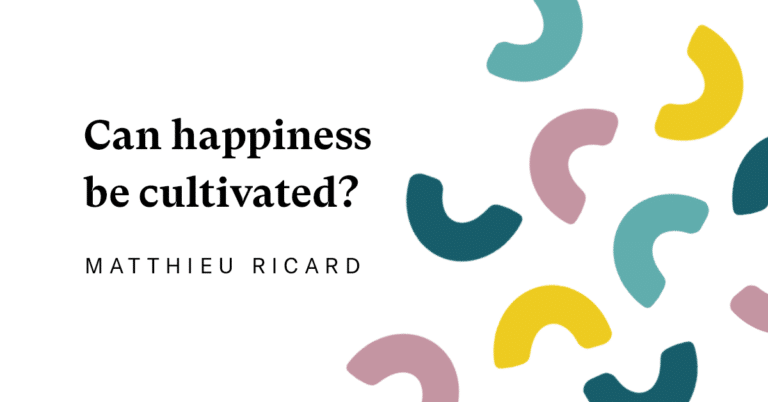
Image by Aikawa Ke/Flickr, Attribution-NonCommercial-NoDerivs.
Simple But Not Easy: The Right Effort of Beginning Again
When I first began studying with the Burmese master Sayadaw U Pandita, I had been practicing meditation for 14 years. He was a powerful teacher with a rigorous pedagogy, requiring that each student meet with him one-on-one six days a week for interviews to describe our meditation experiences to him. Nervous and not sure what to expect from the interviews, I resolved that I would take notes after each of my meditations so that I could describe my experience precisely.
During our first interview, I shared everything I remembered (and had written down) about one of my meditation sittings. U Pandita nodded and said, “Well, in the beginning it can be like that.” A one-sentence response, and that was the end of the interview.
To my disappointment, each of our subsequent interviews followed a similar pattern. I’d come in fully prepared to describe a revelatory meditation sitting or a horrible one (or anything in between), and he would give me the consistent but frustrating reply, “Well, in the beginning it can be like that.”
The beginning?! I’d think to myself. I’ve been practicing for 14 years!
I couldn’t stand the fact that U Pandita thought of me as “at the beginning.” How could he not sense my progress? These feelings of resentment persisted until one day something clicked.
During my previous years living in India, I had been conceiving of my meditation practice in terms of progress. I knew that I was diligent and consistent, and thought I was doing well. I was on the right track toward enlightenment, or something, and wanted to hear that my efforts and perseverance were “paying off.” It’s no surprise that U Pandita’s constant references to my being a “beginner” made me annoyed. I was so obsessed with a goal-oriented way of thinking.
But U Pandita’s words were definitely not meant to invalidate me. I know now that I was simply choosing to let my insecurity dictate my response to him. I was reading negativity in the idea of what it means to be a “beginner.”
Over time, his response invited me to realize the challenge of choice that faces us in terms of how we respond to anything in life — whether in meditation, at work, in our relationships. If we make a commitment to living in the present moment, we are always “at the beginning” of whatever it is we are doing, constantly presented with thoughts, judgments, observations, and/or sensations that interrupt up us amidst our daily activities. The challenge is in the choice to accept these things and simply “begin” again, returning to the present moment, or to grip tightly to some idea of what we should be doing and flood ourselves with judgment in the process.
Many people, myself included, come to meditation with an initial expectation of immediate clarity and peace. We anticipate nirvana, filled with white light and an overwhelming sense of freedom. Contrary to these beliefs, meditation takes effort, a word most of us associate with burden. But the effort we make in meditation is not harsh and fueled by feelings of self-loathing or pressure. It’s an unrestrained willingness to “stick it out,” to recognize our ability to feel a sense of freedom through the act of accepting what is.

The idea of Right Effort is one component of the Buddha’s Eightfold Noble Path, and traditionally means directing our energy toward full awareness, with compassion and courage. But what does the Right Effort look like in our lives?
The other day, my friend told me that she had been having the same argument with her partner, almost every other day for about two weeks. She was aware that there was something about their dynamic and the way they were communicating about this particular issue that was resulting in the same conflict, again and again. As we have all surely experienced, there was something seductive and perhaps perversely comforting about the act of engaging in conflict — of rehearsing the habits of mind that both she and her partner were used to in the context of their relationship.
After those two weeks, however, something clicked for my friend. She told me she was finally able to sit with the feelings of discomfort she felt toward her partner, rather than engaging in a provocative dialogue that merely made the situation worse. The feelings did not go away, and she did not ignore them, but she said she was simply able to sit with herself, to stop and notice — “Ah, I am feeling resentful right now” — rather than immediately text her partner something that she knew would trigger him to engage her in emotional combat.
This act of seeing discomfort for what it was took effort for my friend: she practiced the cultivation of compassionate awareness and gave attention to the feelings she was having without feeling the need to judge, analyze, or act on them. Sure, she admitted that she felt moments of guilt or self-loathing along the way, but, by practicing her choice to make an effort to simply be present with her feelings, she allowed herself to be positioned with greater emotional freedom.
One of the most proactive steps we can take toward cultivating real happiness involves the simple recognition that we can make a choice to fill ourselves and our lives with negative energy. Or not. Ralph Waldo Emerson wrote in his essay “Self-Reliance” that “Nothing can bring you peace but yourself.” Intimacy with our experiences, feelings, and thoughts, in other words, is the simplest and most essential way to feel peace, even in the face of difficult experiences. It involves a willingness to find harmony with the truth of change, of contingency, with not being able to exert control over all that we wish to control. No external set of circumstances can prevent us from peace.
It takes effort to train ourselves to meet joy and sorrow alike with our full attention, kindness, and love — especially when we tend to judge our experiences with assumptions and distorting patterns of thought. But making that effort is not compulsory. It is our choice, a simple choice. And accepting that it may not be the easiest one is the first step in the practice of surrender.

